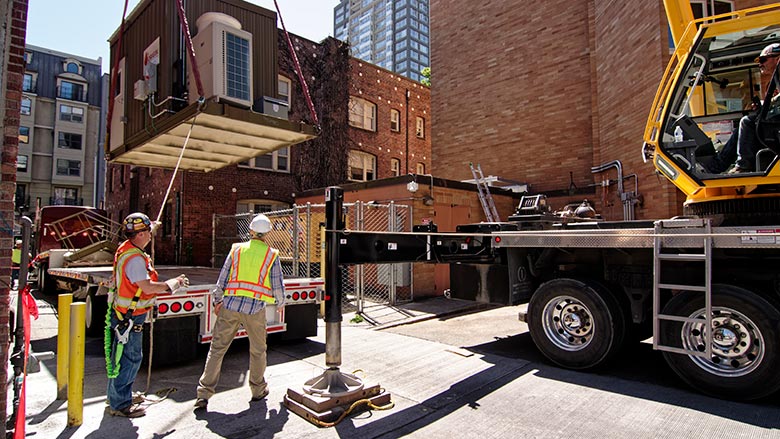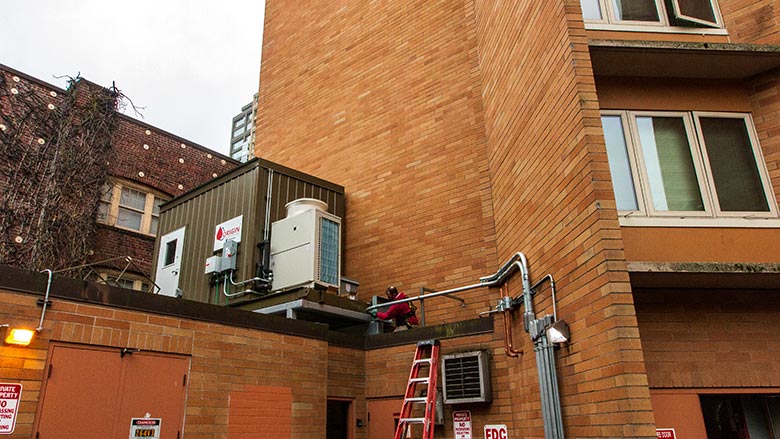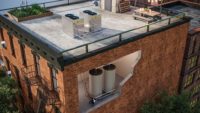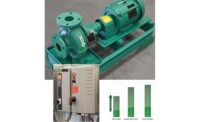As the United States moves to decarbonize commercial and residential building structures, all eyes turn to heat pumps as a way to increase energy efficiency and reduce carbon emissions for not only space heating but domestic hot water as well. This month, PM Engineer Chief Editor Nicole Krawcke had a chance to sit down with Cain White, director of commercial product management for Mitsubishi Electric Trane HVAC US LLC (METUS), about commercial water heating trends, including heat pump water heaters.
 Installed in August 2021, the Bayview commercial heat pump water heating system includes a Mitsubishi QAHV heat pump, primary storage tanks plumbed in parallel and a temperature maintenance system that since it was retrofitted uses electric resistance tanks reused from the old system. The Mitsubishi QAHV uses CO2 as a refrigerant, a natural refrigerant with a global warming potential of 1, and it’s a great candidate for outdoor installations in cooler climates.
Installed in August 2021, the Bayview commercial heat pump water heating system includes a Mitsubishi QAHV heat pump, primary storage tanks plumbed in parallel and a temperature maintenance system that since it was retrofitted uses electric resistance tanks reused from the old system. The Mitsubishi QAHV uses CO2 as a refrigerant, a natural refrigerant with a global warming potential of 1, and it’s a great candidate for outdoor installations in cooler climates.
 The system at Bayview is the first installation of a plug-and-play commercial heat pump water heating system from Mitsubishi in the U.S. Photos courtesy of Seamus Payne
The system at Bayview is the first installation of a plug-and-play commercial heat pump water heating system from Mitsubishi in the U.S. Photos courtesy of Seamus Payne
PM Engineer: Before we get started, why don't you tell our listeners a little bit about your background and what it is you do?
CW: I'm Cain White, director of commercial product management for Mitsubishi Electric Trane US. I've been in the industry about 25 years. I've been working with the Mitsubishi Electric products for that full duration. I'm responsible for all of the commercial products we sell and launch into the US market. That includes VRF air conditioning and heating systems, dedicated outside air systems, Lossnay systems for ERVs, and now also our heat pump water heaters that we've recently launched in the U.S. market.
PM Engineer: What is the top trend you're seeing right now in the commercial water heating market heading into 2023, and what is driving that trend?
CW: We're seeing a general push toward energy efficient commercial, specifically commercial heat pump, hot water heating systems, systems that can achieve high-temperature hot water. I'm talking about up to like 176° F and in cold conditions, so in conditions as low as minus 13° F. So there's a real push towards that type of system, and also systems that are environmentally friendly and that are using CO2, for example, as a refrigerant.
A lot of the push is coming from codes that are out there, specific directives in certain states. For example, in New York, you've got the Climate Mobilization Act that's really pushing engineers and building owners toward environmentally friendly solutions that are using electricity rather than natural gas. We're seeing that type of push in the New York market, but also on the West Coast and in other parts of the country as well.
PM Engineer: That kind of brings us to our next question — I'm seeing so many more state and local governments creating these natural gas bans by certain dates in order to meet decarbonization and electrification goals. What exactly does that mean for the commercial water heating market going forward?
CW: I mean, it's significant. It's a huge development harvested. Traditionally, in the commercial market, people are using natural gas or gas-fired boilers in commercial hot water systems. If gas is not available, then they are potentially using electric resistance-type systems. But the codes are evolving, technologies are evolving, energy efficiencies are moving in the direction where heat pump-type systems are now capable of fulfilling the desire to move away from natural gas. And what we're seeing, for example, in places like Seattle is that codes are being written to where natural gas is no longer being used as a source for hot water and for heating in certain types of buildings, multi-family in those types of things. Actually, that's where the very first Mitsubishi Electric Heat2O system, our commercial CO2 hot water heat from system was installed. In that example, we went into a 100-unit multi-family building, we changed out all of the electric resistance water heaters, massively reduced the energy consumption for that particular building, and they're looking at around a $15,000 saving per year in energy costs.
Want to hear the entire interview? Listen here:



